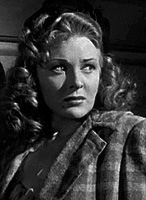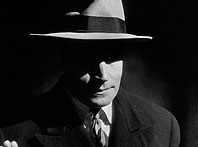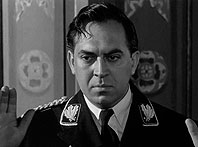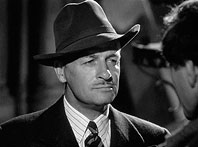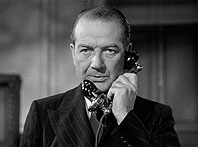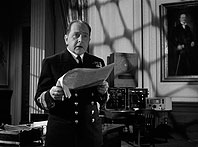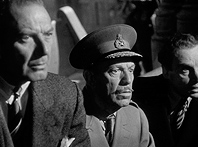Sherlock Holmes Films » The Adventures of Sherlock Holmes
» The Hound of the Baskervilles
» Voice of Terror
» Sherlock Holmes and the Secret Weapon
» Sherlock Holmes in Washington
» Sherlock Holmes Faces Death
» The Spider Woman
» The Scarlet Claw
» The Pearl of Death
» The House of Fear
» The Woman in Green
» Pursuit to Algiers
» Terror by Night
» Sherlock Holmes and the Secret Code
Released: 18th September 1942
Release Order: 3 of 14
Release Order: 3 of 14
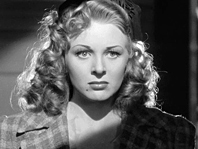
Voice of Terror
The Master Minds of Mystery!
Voice of Terror, aka Sherlock Holmes and the Voice of Terror, is the first film of the series with a World War II theme, and the first of the twelve Universal films. It is beautifully lit and a very enjoyable film with some great scenes, featuring Nazi agents and uniformed soldiers no less. There's a fair few helpings of propaganda along the way, which is not much different to today of course but it's even less subtle. The plot is based loosely on the original story His Last Bow and the real-life story of Lord Haw-Haw.
Synopsis
¡Contains spoilers!
The film begins with the Voice of Terror broadcasting one of his portentous radio messages to the British people, in mocking terms he describes successful sabotage operations, live, as they unfold. The ‘Inner Council’ of British Intelligence, comprising the top bods in military and government circles, are very concerned about the broadcasts. They can only wonder who and where the Voice of Terror is, so they decide to bring in Sherlock Holmes to help track him down.
Despite a distinctly chilly welcome from some members the council, Sherlock Holmes agrees to help in this most important of cases but he insists that he work alone. Back in Baker Street, Dr. Watson cleans his pistol and Holmes reclines in an armchair while the radio plays Beethoven's 5th. He compares a live version with a recorded one and draws a graph, all the while observing an oscilloscope at his elbow.
There's a knock at the door and when Holmes answers it, one of his underground informants, Gavin, falls through the doorway with a knife in his back. He quickly dies after managing to utter one word, “Christopher”. Holmes and Watson leave immediately to find Kitty, Gavin's wife, in Limehouse to see if she knows the significance of Gavin's last word. They're the victims of an assassination attempt en route, the method; an expert knife thrower from Hamburg, the same method as Gavin's murder.
Holmes and Watson soon find a back street dive and ask the landlord to go and fetch Kitty. As they wait her arrival, there's a great scene when Holmes runs into Camberwell, an ex-convict he helped send to prison. Kitty soon arrives and they manage to persuade her to help, once she knows that Nazis are behind Gavin's death. She rouses the pub goers with a patriotic speech and they fan out across London to discover the meaning of the word Christopher.
Holmes visits the Inner Council again where they hear another broadcast from the Voice of Terror, this time the docks in the East End have been bombed. Holmes tells them that the Voice of Terror is not broadcast live, but rather it's recorded in England and then picked up by a plane and flown to Ziesberg, where it is then broadcast. The council is sceptical of the theory, but Holmes is resolute. Kitty arrive at the council's room and Holmes and Watson immediately leave, after learning from her that Christopher refers to some old pre-Victorian docks in the East End.
Sir Lloyd of the Inner Council follows Holmes and Watson to the Christopher docks, and after they let him catch up, he tags along. As they search the docks, they are stopped by a man - R. F. Meade - wielding a revolver and a torch. After some politically charged banter, Holmes and company, with the help of some of the pub patrons, overpower Meade and his cohorts but he manages to escape through a trapdoor into a waiting speedboat below.
A few days later, the police are chasing Kitty for pick-pocketing, and she takes shelter in Meade's house, at his request. Later that day at Holmes' Baker Street lodgings, he begins to suspect that there is a leak in the Inner Council as the German sabotage always thwarts a secret British operation. Kitty comes visiting with important information, she had befriended Meade on the instruction of Holmes, in order to uncover the Nazi's plans. She says that Meade is going to take care of something in Seven Oaks that night, where Sir Barham of the Inner Council lives in isolation.
Holmes and Watson soon arrive at Sir Barham's house in Kent, and meet him as he's doing his rounds as an Air Raid Warden. A German plane lands to pick up a package from Meade who lurks in the bushes nearby, after the pick up has been made, Sir Barham races towards the plane shooting his revolver as it takes off again. Back in London, Meade and Kitty are talking in his house and he makes a rather disturbing speech about a dream he had as child where he “rode over the bodies of underlings” and he promises to share his glory with her before they both set off by cab.
The Inner Council and Holmes listen to another broadcast by the Voice of Terror, boasting of an imminent invasion on the English coast, so they decide to move defences to the north-east, against the advice of Holmes who is by now at loggerheads with the council. A cabbie arrives and tell Holmes that Kitty and Meade went to a bombed village on the South coast the night before. Thankfully, a 'phone call from Downing Street informs the council that Holmes has the backing of the Prime Minister, and so they acquiesce and troops are sent to the south coast.
Meade has his orders and takes Kitty with him to an isolated, bombed out church on the coast where he awaits the real German invasion forces with his comrades in arms. Holmes, Watson and the Inner Council arrive at the church, along with a company of infantry, who arrest the conspirators. Holmes reveals that the true identity of The Voice of Terror is a member of the Inner Council, and that they'd concocted the ruse to move defences to the north-east.
The Voice of Terror is none other than Sir Evan Barham, who is actually a German impostor. In World War I, the real Barham was a prisoner in a German war camp and had an uncanny resemblance to a Heinrich Von Bork, a member of the German Secret Service; the real Barham was summarily murdered and Von Bork took his place, with a little help of plastic surgery. Those cunning Nazis certainly planned things in advance.
Holmes explains that the defences weren't taken to the north-east, and are still in place. And as they listen to the news that British planes have destroyed the German invasion forces, Meade grabs a pistol and shoots Kitty, who dies immediately.
The film closes with Holmes paying tribute to Kitty and he makes a foreboding speech, in which he speaks of the coming storm and chill winds, i.e. war, but he ends on an optimistic note as the closing music fades in.
Quotes
| Sir Evan : | Mr. Holmes! I want to apologise for your rather lukewarm reception here. |
| Holmes: | Well thank you Sir Evan, I'm used to the chilly atmosphere of high places. |
| Camberwell: | Just who was it told ya it was me 'a slit the throat of that swine Tarlton? I want an answer! |
| Holmes: | You told me. |
| Camberwell: | Me? |
| Holmes: | On the windowsill, you left four infinitesimal pieces of ash, from a particularly revolting type of tobacco that you were known to use. The knife-blade was sharpened by a left-handed man. You signed your name to the crime. |
| Camberwell: | So that's what. |
| Holmes: | Exactly. Very careless. |
| Camberwell: | Careless. It's criminal I calls it! I ought to be shot! |
| Holmes: | Perhaps someday you will be. |
Director: John Rawlins
Running Time: 65 minutes
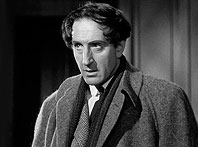
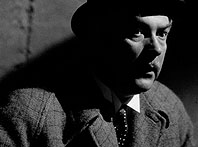
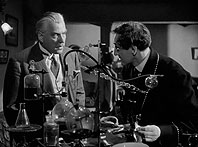
Running Time: 65 minutes



Favourite Character
Camberwell
Working Title
Sherlock Holmes Saves London
Miscellaneous
Henry Daniell went on to play Professor Moriarty in The Woman in Green
Evelyn Ankers was known as the “Scream Queen” because of all the Universal horror films she appeared in.
Evelyn Ankers was known as the “Scream Queen” because of all the Universal horror films she appeared in.
Look Out For
Kitty's rousingly patriotic speech to the patrons of a nefarious dive in the East End.
Holmes and Kitty's scene in the East-end dive. Rawlins was influenced by German Expressionist cinema and uses tight shots and soft-focus.
R.F. Meade's unnerving speech about a childhood dream.
Holmes and Kitty's scene in the East-end dive. Rawlins was influenced by German Expressionist cinema and uses tight shots and soft-focus.
R.F. Meade's unnerving speech about a childhood dream.

